Herbal teas are great for soothing sore throats because they provide hydration, which helps ease irritation. The warmth of the tea comforts your throat, while natural anti-inflammatory properties reduce swelling. Ingredients like honey not only coat and soothe but also offer antibacterial benefits. Teas like chamomile and ginger boast immune-boosting antioxidants and relax you, making it easier to rest. Plus, they're caffeine-free, so you can sip them any time. If you're curious about specific herbs and recipes to create the perfect soothing cup, there's plenty more to explore.
Benefits of Herbal Teas
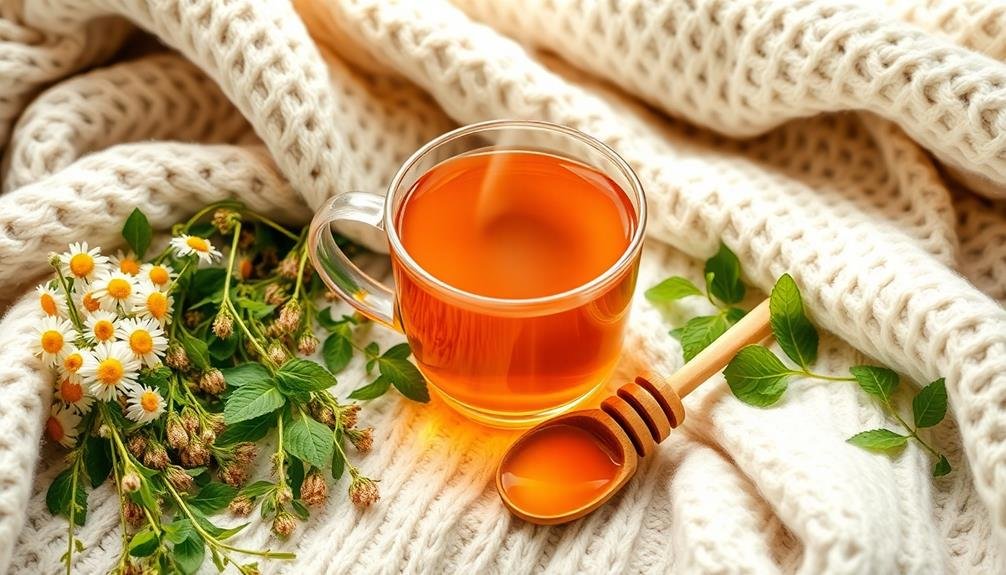
Herbal teas offer a soothing remedy for sore throats, providing both comfort and relief. When you sip on a warm cup, the gentle heat can help ease the discomfort, making it feel like a cozy hug for your throat. The act of drinking tea itself hydrates your body, which is essential when you're feeling under the weather. Staying hydrated helps thin mucus, easing irritation and promoting healing.
Additionally, herbal teas often come packed with antioxidants. These powerful compounds can support your immune system, enabling your body to fight off whatever's causing your sore throat more effectively. You'll also appreciate how many herbal blends have natural anti-inflammatory properties, helping to reduce swelling and irritation in your throat.
Another benefit is the calming effect of herbal teas. The ritual of preparing and enjoying a warm drink can provide a mental break, reducing stress and promoting relaxation. This can be particularly beneficial when you're feeling unwell.
Key Ingredients for Relief
When you're battling a sore throat, certain ingredients can really make a difference.
Honey's soothing properties coat your throat, providing immediate relief, while anti-inflammatory herbs can help reduce swelling and discomfort.
Let's explore how these key elements work together to ease your pain.
Honey's Soothing Properties
Honey's natural soothing properties make it a powerful ally in combating sore throats. When you add honey to your herbal tea, you're not just sweetening your drink; you're enhancing its healing potential. Honey coats your throat, creating a protective layer that can help reduce irritation and discomfort. This coating effect can be particularly comforting, especially when you're struggling with a scratchy or painful throat.
Moreover, honey has antibacterial qualities that can aid in fighting off infections. When you're feeling under the weather, a spoonful of honey can help support your immune system. It's also rich in antioxidants, which can assist your body in recovering more quickly.
To enjoy its benefits, try mixing a tablespoon of honey into warm herbal tea, such as chamomile or ginger. This combination not only provides relief but also promotes hydration, which is essential for recovery.
Anti-Inflammatory Herbs
A variety of anti-inflammatory herbs can considerably ease the discomfort of a sore throat. Incorporating these herbs into your herbal tea can provide soothing relief and help reduce inflammation.
One of the most effective herbs is marshmallow root. It contains mucilage, which coats your throat and offers a protective barrier against irritation.
Another powerful herb is slippery elm. Similar to marshmallow root, it also provides a soothing effect due to its mucilage content. You'll find that a tea made from slippery elm can considerably calm your throat.
Chamomile is another excellent choice. Its anti-inflammatory properties not only help reduce swelling but also promote relaxation, making it easier for you to rest.
Ginger, with its warming qualities, can further enhance circulation and fight inflammation, providing additional comfort.
Popular Herbal Tea Options
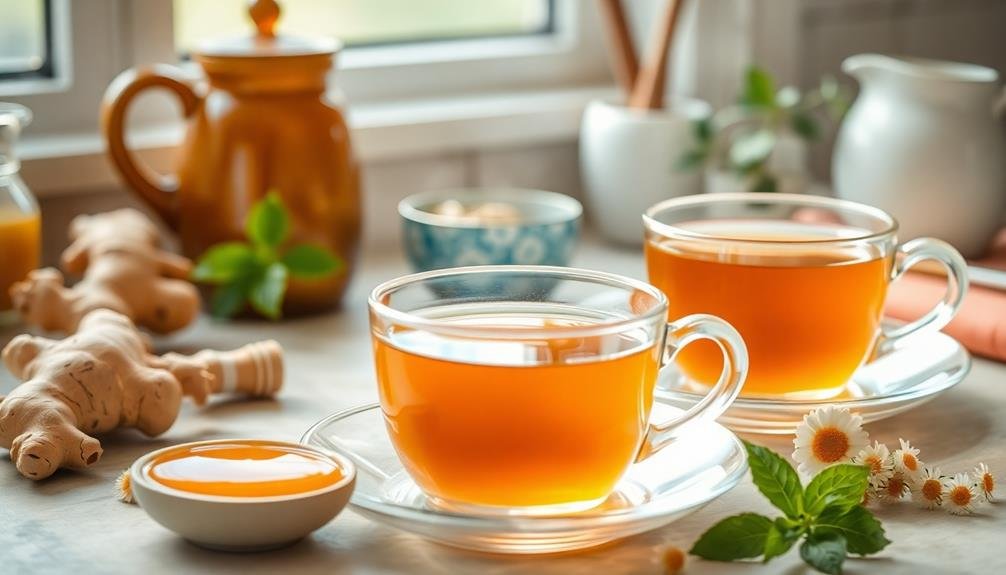
When you're looking for relief from a sore throat, consider popular herbal teas like chamomile, ginger, and licorice root.
Each of these options offers unique benefits that can soothe discomfort and promote healing.
Let's explore how these herbal teas can help you feel better.
Chamomile Tea Benefits
Enjoying chamomile tea offers a soothing remedy for sore throats, thanks to its anti-inflammatory and antioxidant properties. When you sip on this herbal delight, you're not just treating discomfort; you're giving your body a boost.
Here are some key benefits of chamomile tea:
- Reduces Inflammation: Chamomile can help decrease swelling in your throat, making it feel more comfortable.
- Promotes Relaxation: The calming effects of chamomile can ease stress, which may help your body recover faster.
- Supports Immune Function: Packed with antioxidants, chamomile can enhance your immune system, helping you fight off infections.
- Aids Sleep: If your sore throat keeps you awake, chamomile's mild sedative properties can help you get the rest you need.
Ginger Tea Properties
Ginger tea stands out as a powerful option for soothing sore throats, thanks to its unique properties. It contains gingerol, a compound known for its anti-inflammatory and antioxidant effects. When you sip on ginger tea, you're not just enjoying a warm beverage; you're also giving your body a natural boost in fighting inflammation, which can help alleviate throat discomfort.
Additionally, ginger has antimicrobial properties that can combat harmful bacteria and viruses. This means that when you drink ginger tea, you're potentially reducing the risk of further infection. The warmth of the tea also helps to relieve throat irritation, making it easier for you to swallow and talk.
You might also appreciate that ginger tea can stimulate saliva production, which helps keep your throat moist and reduces that scratchy feeling. If you prefer a little extra flavor, consider adding honey or lemon, both of which can enhance the soothing effects of ginger.
Licorice Root Effects
Licorice root tea offers a soothing remedy for sore throats, thanks to its natural anti-inflammatory and expectorant properties. If you're looking for relief, this herbal tea should definitely be on your radar.
Here are some key effects you can expect from licorice root:
- Soothing Effect: The tea coats your throat, reducing irritation and providing immediate comfort.
- Anti-inflammatory Action: It helps decrease inflammation, which can alleviate pain and swelling in the throat.
- Expectorant Properties: Licorice root aids in loosening mucus, making it easier for you to clear your throat and breathe more comfortably.
- Immune Support: Rich in antioxidants, licorice root can bolster your immune system, helping you fight off infections.
When you brew a cup of licorice root tea, you're not just enjoying a warm beverage; you're also harnessing the power of nature to support your throat health.
Remember to consult with a healthcare professional if you have any underlying conditions, as licorice root can interact with certain medications.
Enjoy this herbal tea, and savor its soothing effects!
DIY Herbal Tea Recipes
Craft your own soothing herbal tea to combat a sore throat with simple ingredients you likely have at home. One of the easiest recipes involves honey and lemon.
Mix a tablespoon of honey with the juice of half a lemon in a cup of warm water. This blend not only soothes your throat but also offers a boost of vitamin C.
Another great option is ginger tea. Slice a small piece of fresh ginger and steep it in hot water for about 10 minutes.
Add honey to sweeten it and enjoy its anti-inflammatory properties. If you prefer a more aromatic blend, try chamomile tea. Brew chamomile flowers or tea bags in hot water, letting it steep for five minutes.
This gentle tea can relax you while easing throat discomfort. For a minty twist, use peppermint leaves. Steep fresh or dried leaves in hot water for a revitalizing drink that can help clear nasal passages too.
Finally, consider a thyme infusion; steep a teaspoon of dried thyme leaves in boiling water for 10 minutes. Strain and sip for its antiseptic benefits.
Enjoy experimenting with these recipes to find your favorite!
How to Brew Herbal Teas
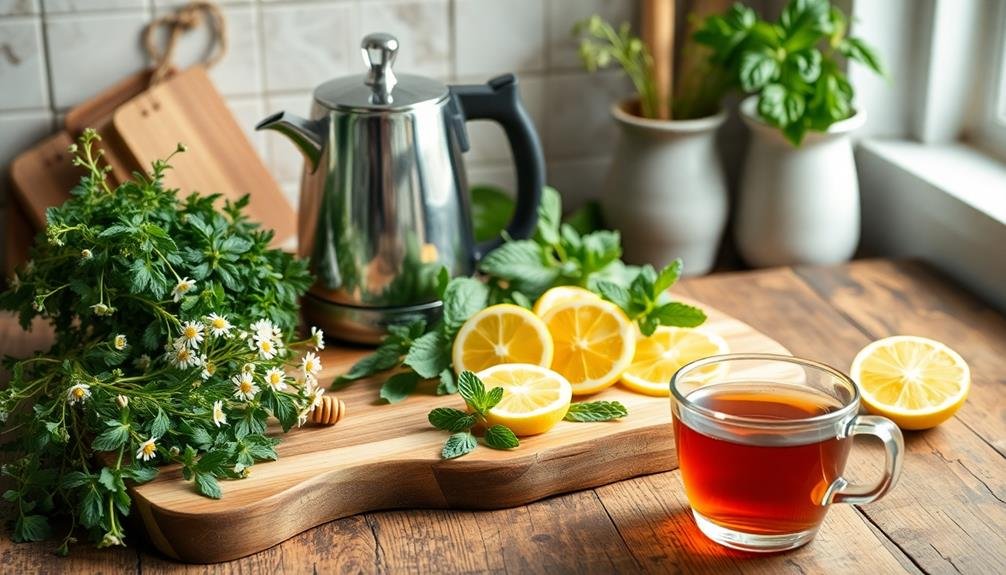
Brewing herbal teas is a simple yet rewarding process that can enhance your comfort during a sore throat. The right technique can help you reveal the full potential of the herbs, maximizing their soothing benefits. Here's a quick guide to get you started:
- Choose Your Herbs: Select herbs known for their soothing properties, like chamomile, ginger, or slippery elm.
- Measure the Herbs: Use about 1-2 teaspoons of dried herbs or 1-2 tea bags per cup of water. Adjust based on your flavor preference.
- Boil Water: Bring fresh, filtered water to a boil. If you're using delicate herbs, let the water cool slightly to avoid losing their beneficial properties.
- Steep: Pour the hot water over the herbs and let them steep for 5-10 minutes. The longer you steep, the stronger the flavor and benefits.
Once brewed, you can enjoy your herbal tea warm. The steam can also help soothe your throat.
With just a few steps, you'll have a comforting cup ready to help ease your discomfort!
Adding Sweeteners and Flavors
Enhancing the flavor of your herbal tea can make it even more enjoyable, especially when you're dealing with a sore throat. Adding sweeteners and flavors not only improves the taste but can also provide added soothing benefits. Here are some popular options you might consider:
| Sweetener/Flavor | Benefits | Tips for Use |
|---|---|---|
| Honey | Natural antibacterial properties | Add while tea is warm |
| Lemon | Rich in vitamin C, boosts immunity | Squeeze fresh juice |
| Ginger | Anti-inflammatory, can ease throat pain | Grate fresh ginger |
| Cinnamon | Antioxidant properties, adds warmth | Sprinkle a dash |
| Peppermint | Cooling effect, can relieve throat irritation | Use fresh or dried leaves |
Experiment with these additions to find the combination that works best for your taste buds. Remember, moderation is key; too much sweetener can overpower the natural flavors of your herbal tea. By customizing your tea, you'll not only enjoy the drink more, but you may also find relief from your sore throat symptoms. So go ahead, get creative, and sip your way to comfort!
Caffeine-Free Alternatives Explained
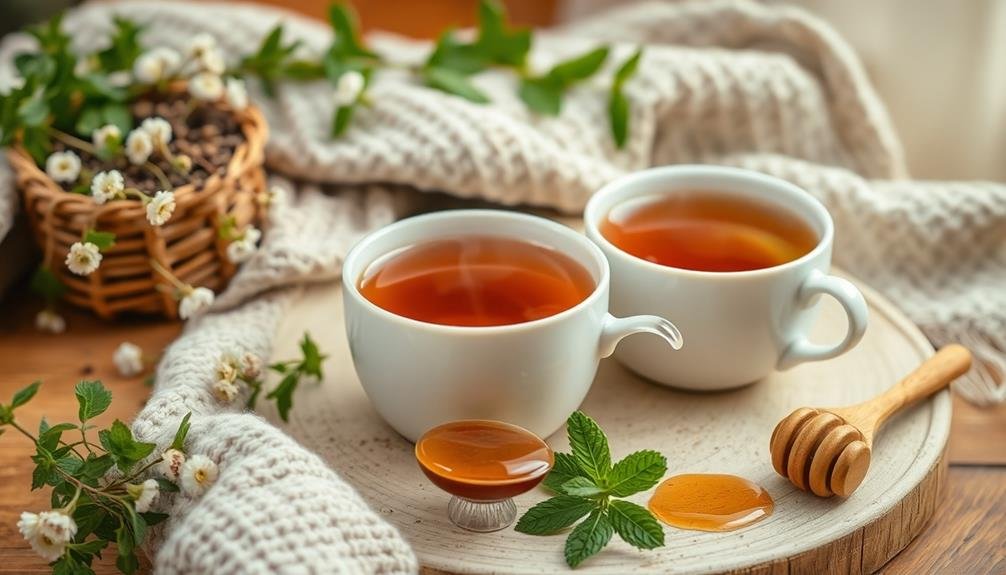
When you're nursing a sore throat, choosing caffeine-free herbal teas can be a game-changer, as they offer soothing qualities without the stimulating effects of caffeine.
These teas can help you relax and hydrate, making your recovery process smoother. Here are some fantastic caffeine-free options to evaluate:
- Chamomile: Known for its anti-inflammatory properties, chamomile tea can help reduce throat irritation and promote relaxation.
- Peppermint: The menthol in peppermint not only provides a cooling sensation but also acts as a natural decongestant, easing your breathing.
- Ginger: With its warming properties, ginger tea can soothe pain and inflammation while boosting your immune system.
- Lemon Balm: This herb has a mild sedative effect, making it perfect for calming your nerves while also offering antiviral benefits.
When to Drink Herbal Teas
Knowing when to sip herbal teas can make a big difference in soothing your sore throat.
You'll want to enjoy them at specific times, especially when you notice signs that need immediate relief.
Let's explore the best moments to brew a comforting cup.
Best Times to Sip
Sip herbal teas throughout the day to soothe a sore throat effectively. Timing your sips can make a significant difference in how you feel. Here are the best times to enjoy your herbal tea:
- Morning Wake-Up: Start your day with a warm cup to soothe your throat after sleeping. The warmth can help ease morning discomfort.
- Mid-Morning Break: Take a moment for yourself with a calming herbal tea. This can help you relax and keep your throat hydrated as you go about your day.
- Afternoon Slump: When that afternoon fatigue hits, reach for a soothing tea instead of coffee. The warm liquid can provide comfort and help reduce irritation.
- Before Bed: Wind down with a gentle herbal tea. Not only will it help ease your throat, but it can also promote relaxation, leading to a better night's sleep.
Signs for Immediate Relief
Feeling discomfort in your throat can be frustrating, and knowing when to reach for herbal tea can provide immediate relief. If you notice a scratchy sensation or a burning feeling when you swallow, it's a clear sign to brew a cup of herbal tea. The warmth from the tea helps soothe irritation, making you feel more comfortable right away.
When you experience dryness or the need to clear your throat frequently, herbal teas can be your best friend. Ingredients like chamomile and marshmallow root can help moisten your throat and reduce that annoying urge to cough.
If you're feeling congested, herbal teas with peppermint or ginger can also help ease your symptoms and open up your airways.
Additionally, if you're dealing with a sore throat after a long day of talking or singing, sipping herbal tea can provide that much-needed relief.
Always listen to your body; if you feel any discomfort, don't hesitate to reach for that cup of herbal goodness. Remember, the right herbal tea at the right time can make all the difference in how quickly you recover and feel your best.
Precautions and Considerations
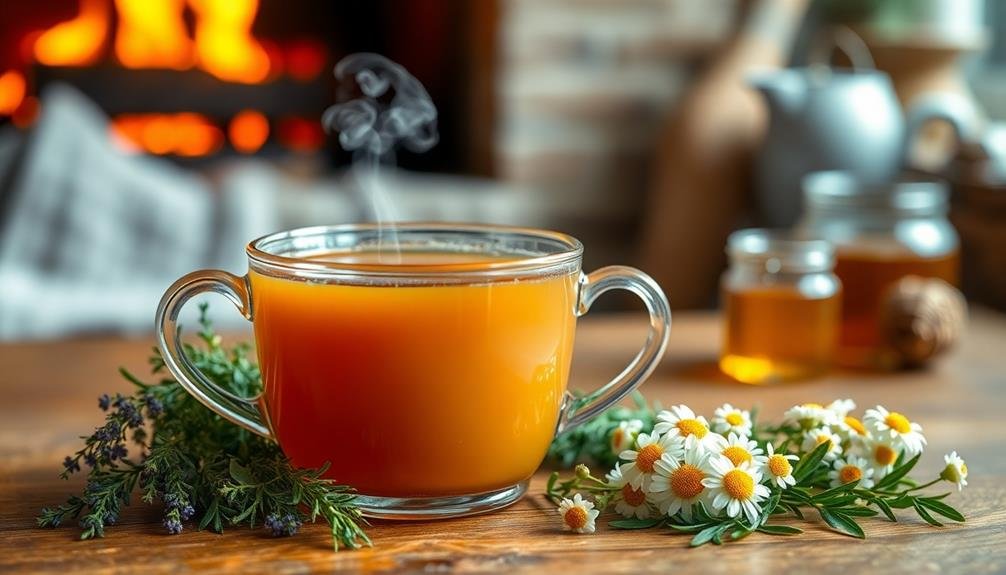
When it comes to using herbal teas for soothing a sore throat, being mindful of certain precautions can enhance your experience and safety. Here are some key considerations to keep in mind:
- Allergies: Always check for any allergies you may have to specific herbs. Some common ingredients, like chamomile, can trigger reactions in sensitive individuals.
- Quality: Choose high-quality herbal teas from reputable sources. Contaminants or low-quality ingredients can lead to adverse effects.
- Interactions: Be aware of potential interactions with medications you're taking. Some herbs can affect how your medications work, so consult your healthcare provider if you're unsure.
- Pregnancy and Nursing: If you're pregnant or nursing, not all herbs are safe. Research or ask a healthcare professional about which herbal teas are appropriate for you.
Enhancing Your Herbal Experience
Enhancing your herbal experience can transform a simple cup of tea into a soothing ritual for your sore throat. Start by choosing the right herbs. Chamomile, peppermint, and ginger are excellent options known for their anti-inflammatory properties.
Once you've selected your herbal blend, pay attention to the brewing process. Use fresh, filtered water and steep your tea for the recommended time to maximize flavor and benefits.
Next, consider adding natural sweeteners like honey. Honey not only adds a pleasant taste but also coats your throat, providing extra relief. A splash of lemon juice can enhance the flavor and add vitamin C, which supports your immune system.
Don't forget about the ambiance! Create a calming environment by dimming the lights and playing soft music.
Take a moment to breathe deeply as you sip your tea, focusing on the warmth and comfort it brings. This mindfulness practice can elevate your experience and promote relaxation.
Frequently Asked Questions
Can Herbal Teas Replace Traditional Medicine for Sore Throats?
Herbal teas can complement traditional medicine for sore throats, but they shouldn't entirely replace it. They offer soothing effects and hydration, yet you should consult a healthcare professional for persistent symptoms or severe discomfort.
How Often Should I Drink Herbal Tea for Sore Throat Relief?
You should drink herbal tea several times a day for sore throat relief. Aim for three to four cups, allowing the soothing warmth and natural ingredients to help ease discomfort and promote healing effectively.
Are There Any Side Effects of Herbal Teas for Sore Throats?
You might experience mild side effects from herbal teas, like stomach upset or allergic reactions. It's crucial to monitor how you feel after consumption and consult a healthcare professional if any unusual symptoms arise.
Can Children Drink Herbal Teas for Sore Throats Safely?
Yes, children can safely drink herbal teas for sore throats, but always check with a pediatrician first. Confirm the tea is caffeine-free, and monitor for any allergic reactions or sensitivities. Keep the temperature mild.
What Is the Best Temperature for Drinking Herbal Teas?
You should drink herbal teas at a moderate temperature, ideally around 130-160°F (54-71°C). This range helps you enjoy the flavors without burning your mouth, ensuring a comfortable and soothing experience with each sip.
In Summary
Incorporating herbal teas into your routine can be a soothing way to tackle sore throats. With their natural ingredients and numerous benefits, they offer a comforting solution without the jitters. Whether you choose to brew your own or explore popular options, you'll find relief in every sip. Just remember to listen to your body and enjoy these warm brews at the right times. Embrace the herbal experience and let it nurture your throat back to health!


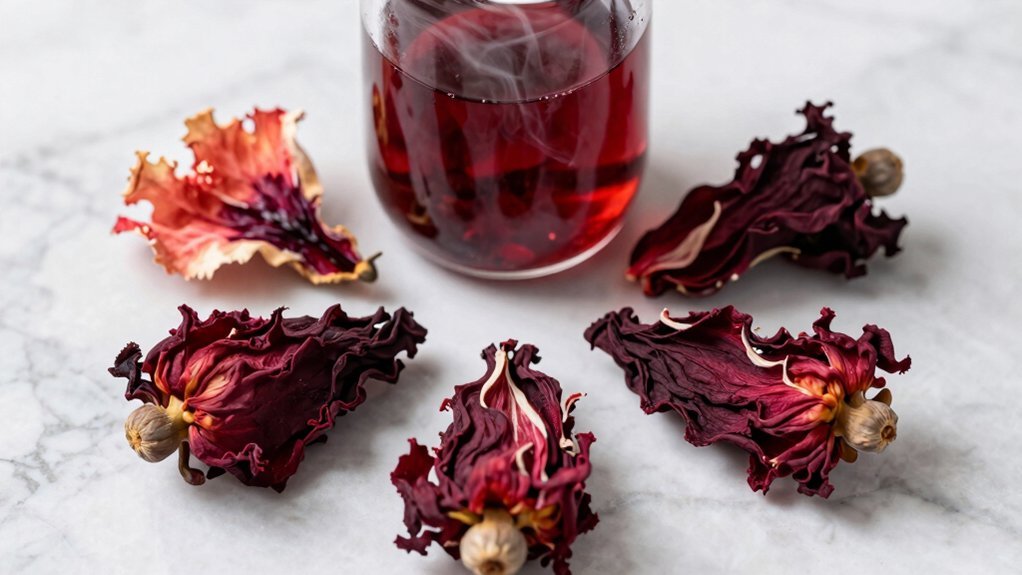


Leave a Reply